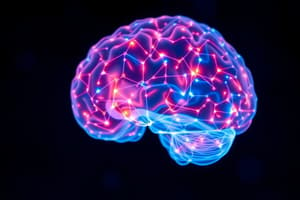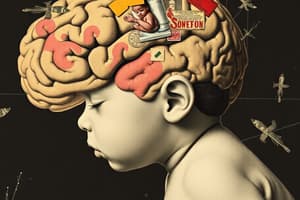Podcast
Questions and Answers
What is the primary focus of developmental psychology?
What is the primary focus of developmental psychology?
- The impact of environmental factors on senior citizens
- The changes in physical and emotional abilities throughout life (correct)
- The influence of genetics on adulthood
- How adults interact with each other
Which term describes the time-sensitive windows in which certain abilities may develop?
Which term describes the time-sensitive windows in which certain abilities may develop?
- Critical and sensitive periods (correct)
- Developmental milestones
- Cognitive thresholds
- Emotional intervals
What happens to unused synapses after the age of 2?
What happens to unused synapses after the age of 2?
- They become more active
- They are reinforced and strengthened
- They are kept intact regardless of use
- They are trimmed away (correct)
What is the gestation period for humans?
What is the gestation period for humans?
Exposure to teratogens can lead to what kind of complications during fetal development?
Exposure to teratogens can lead to what kind of complications during fetal development?
What is a potential outcome for children exposed to alcohol in the womb?
What is a potential outcome for children exposed to alcohol in the womb?
At what age does an infant's brain reach about 50% of the size of an adult brain?
At what age does an infant's brain reach about 50% of the size of an adult brain?
What is the term for the formation of synapses between neurons in the brain?
What is the term for the formation of synapses between neurons in the brain?
What is object permanence?
What is object permanence?
At what age do children begin to demonstrate the ability to perform operations on concrete problems according to Piaget?
At what age do children begin to demonstrate the ability to perform operations on concrete problems according to Piaget?
Which task is used to illustrate egocentrism in children?
Which task is used to illustrate egocentrism in children?
What is the key cognitive ability that infants lack during the sensorimotor stage?
What is the key cognitive ability that infants lack during the sensorimotor stage?
Which of the following best describes constructivism, as proposed by Piaget?
Which of the following best describes constructivism, as proposed by Piaget?
In Piaget's concrete operational stage, what becomes important for problem solving?
In Piaget's concrete operational stage, what becomes important for problem solving?
What type of error do infants demonstrate in the A-not-B task?
What type of error do infants demonstrate in the A-not-B task?
Which of the following stages does Piaget suggest occurs last in a child’s cognitive development?
Which of the following stages does Piaget suggest occurs last in a child’s cognitive development?
During which stage are children still egocentric and lack the ability to perform logical operations?
During which stage are children still egocentric and lack the ability to perform logical operations?
What is the main characteristic of the sensorimotor stage?
What is the main characteristic of the sensorimotor stage?
What is conservation in the context of Piaget's theory?
What is conservation in the context of Piaget's theory?
Which researcher introduced the concept of psychosocial development alongside Piaget?
Which researcher introduced the concept of psychosocial development alongside Piaget?
What cognitive ability begins to emerge at the end of the sensorimotor stage around 2 years old?
What cognitive ability begins to emerge at the end of the sensorimotor stage around 2 years old?
Flashcards
Developmental Psychology
Developmental Psychology
The study of how and why biological, physical, cognitive, emotional, and social abilities develop throughout childhood.
Stability vs. Change
Stability vs. Change
A debate in developmental psychology considering if traits remain consistent or change throughout life.
Continuity vs. Discontinuity
Continuity vs. Discontinuity
A debate in developmental psychology that contrasts gradual, continuous development vs. abrupt stages.
Nature vs. Nurture
Nature vs. Nurture
Signup and view all the flashcards
Critical Period
Critical Period
Signup and view all the flashcards
Teratogen
Teratogen
Signup and view all the flashcards
Fetal Alcohol Spectrum Disorders (FASD)
Fetal Alcohol Spectrum Disorders (FASD)
Signup and view all the flashcards
Neural Plasticity
Neural Plasticity
Signup and view all the flashcards
Object Permanence
Object Permanence
Signup and view all the flashcards
Sensorimotor Stage
Sensorimotor Stage
Signup and view all the flashcards
A-not-B Error
A-not-B Error
Signup and view all the flashcards
Pre-operational Stage
Pre-operational Stage
Signup and view all the flashcards
Egocentrism
Egocentrism
Signup and view all the flashcards
Conservation
Conservation
Signup and view all the flashcards
Concrete Operational Stage
Concrete Operational Stage
Signup and view all the flashcards
Formal Operational Stage
Formal Operational Stage
Signup and view all the flashcards
Constructivism
Constructivism
Signup and view all the flashcards
Piaget's Stages of Development
Piaget's Stages of Development
Signup and view all the flashcards
Perseverative Reaching
Perseverative Reaching
Signup and view all the flashcards
Cognitive Development
Cognitive Development
Signup and view all the flashcards
Industrial Revolution
Industrial Revolution
Signup and view all the flashcards
Stage Theory
Stage Theory
Signup and view all the flashcards
Operation
Operation
Signup and view all the flashcards
Study Notes
Developmental Psychology
- Focuses on how and why biological, physical, cognitive, emotional, and social abilities develop throughout childhood.
- Key debates include stability vs. change, continuity vs. discontinuity, nature vs. nurture, and critical vs. sensitive periods.
- Studying development helps understand adult minds, clinical conditions, and childhood abilities.
Infant Development
- Human development begins in utero.
- Gestation period is roughly 38-40 weeks (9 months).
- Infant brains are structurally similar to adult brains but are smaller (about a quarter the size).
- By 6 months, the brain reaches about 50% of its adult size.
Infant Development - Before Birth
- Brain neurons are not fully myelinated or connected at birth.
- Myelination and synaptogenesis (formation of synapses) continue until around 2 years old.
- Unused synapses are pruned throughout development.
- Neural plasticity (brain's ability to form and maintain synapses) decreases with age.
Infant Development - Prenatal Damage & Teratogens
- Damage can occur to an infant brain before birth.
- Teratogens are substances that cause atypical development if present during prenatal exposure.
- Exposure to harmful substances (e.g. Teratogens) during pregnancy negatively impacts development.
- Examples include air pollution (leading to genetic mutations, per Perera et al, 2002) and PVC exposure (leading to shorter pregnancies and early delivery, per Latini et al, 2003).
- Fetal alcohol spectrum disorders (FASD) can result from prenatal alcohol exposure.
FASD Cognitive and Behavioral Impairments
- Infancy: Slower reaction times.
- Preschool: Decreased attention, hyperactivity.
- Childhood: Learning problems, memory deficits.
- Adulthood: Impaired problem-solving and higher rates of substance dependence.
A Brief History of Studying Development
- Increased need for an educated workforce during the Industrial Revolution fueled early research.
- Initial focus was on cognitive development for education.
- Later research explored emotional/social development, and adulthood development.
- Key figures include John B. Watson, Charles Darwin, and Wilhelm Preyer.
- By 1880, 47 empirical studies were conducted across Europe and North America.
Leading Figures in Developmental Psychology
- Jean Piaget (1896-1980): A Swiss child psychologist who proposed a stage theory of cognitive development.
- Also relevant: Sigmund Freud's psychodynamic theory and Erik Erikson's psychosocial theory.
Piaget's Stages of Cognitive Development
- Sensorimotor (0-2 years): Infants sense and move but have limited cognition. Object permanence (understanding objects exist even when unseen) is a key cognitive ability not fully grasped at this stage.
- Preoperational (2-7 years): Egocentrism (inability to see things from another's perspective) is characteristic; children are biased by their perceptions and cannot use operations.
- Concrete Operational (7-12 years): Children can solve concrete problems using operations.
- Formal Operational (12 years +): Systematic, rigorous reasoning and use of hypothetical situations characterize this stage; children can conduct experiments on abstract situations that go beyond their immediate perception.
Key Cognitive Concepts
- Object Permanence: Understanding that objects exist even when out of sight.
- A-not-B Error: Infants persist in searching for an object in a familiar location (A) even after it’s moved to a new location (B). This signifies perseverative reaching.
- Egocentrism: Inability to take another's perspective.
- Conservation: Understanding that changes in appearance do not change underlying properties (e.g., quantity, volume).
- Mental Imagery: Representing objects and events mentally.
- Operations: Logical mental rules to solve problems.
- Constructivism: Children actively build their understanding of the world.
Studying That Suits You
Use AI to generate personalized quizzes and flashcards to suit your learning preferences.




